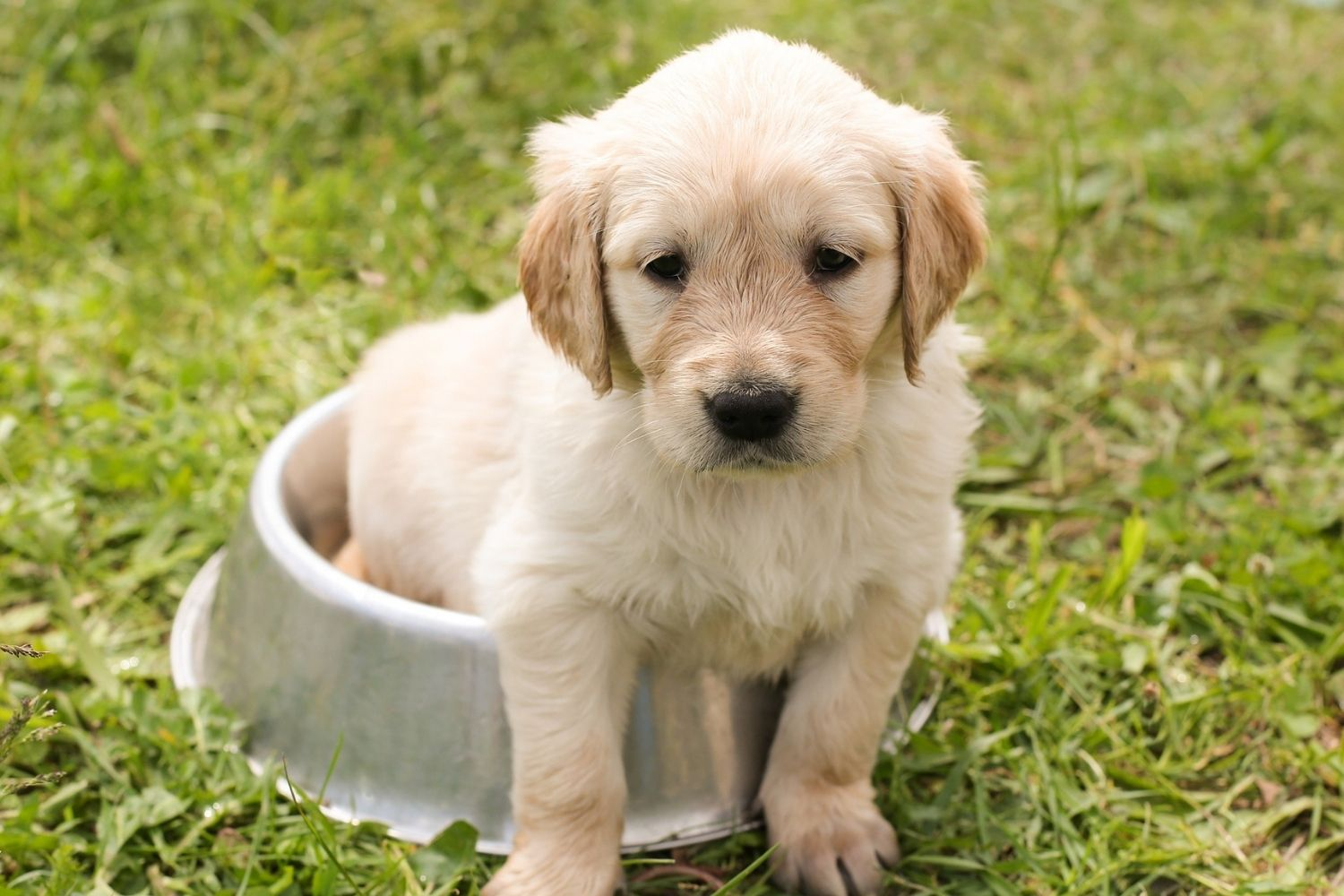A Golden Retriever pup can bring you a lot of joy, but at the same time, a lot of challenges. One of those is to clean up pee around the house every day, especially if you have carpets. Really, it feels like they never learn proper manners!
Don’t worry – that’s why we are here! In this guide on Golden Retriever potty training, our experts will analyze these pups’ specific needs and tendencies. From there, we have several secrets to reveal that can help you potty train your fur baby in no time. Ready? Let’s begin!
Why Golden Retrievers Excel at Potty Training
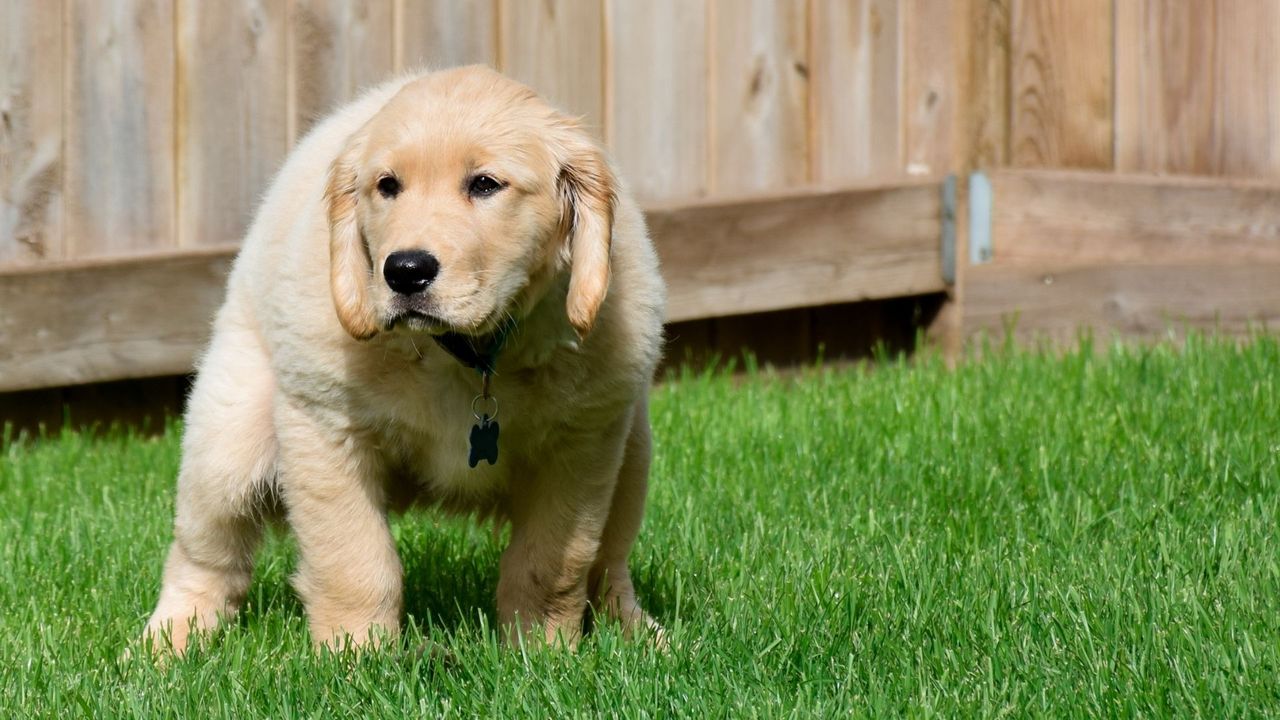
Good news for Golden Retriever owners: these intelligent dogs are typically quick learners when it comes to house training. Their eager-to-please nature and high intelligence make them excellent candidates for consistent training. However, like any puppy, they need patient guidance and clear direction to understand what you expect from them.
The breed’s natural intelligence and family-oriented personality make them particularly receptive to positive reinforcement techniques. While every puppy is unique, Golden Retrievers often grasp potty training concepts faster than other breeds, especially when training starts early and remains consistent.
Understanding Your Puppy’s Natural Schedule
Before diving into training techniques, let’s talk about what’s realistic for your Golden Retriever puppy. Those tiny bladders can only hold so much! Young puppies typically need bathroom breaks every 1-2 hours during the day. This isn’t because they’re being difficult – it’s simply a matter of physical development.
Your puppy will need to go potty at predictable times: after waking up, following meals or drinks, and after playtime. Understanding these natural patterns is your first step toward successful training. Most Golden Retrievers gain reliable bladder control between 4-6 months of age, though every puppy develops at their own pace.
As a general rule of thumb, puppies can hold their bladder for about one hour per month of age, up to about 8-9 hours maximum when they’re adults. However, just because they can hold it doesn’t mean they should – regular breaks are still important for your dog’s comfort and health.
Creating the Perfect Potty Training Environment
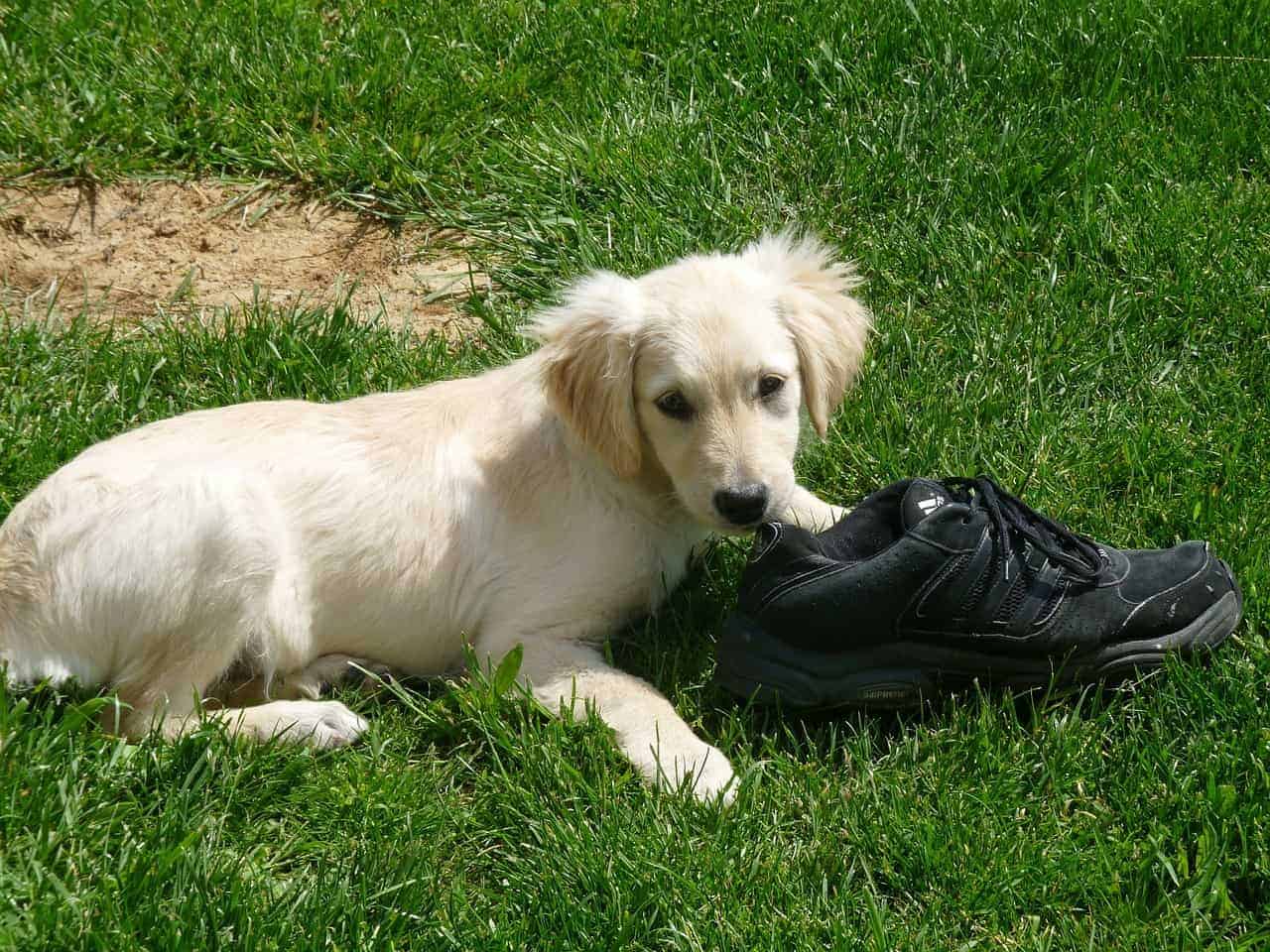
Setting up the right environment makes a world of difference in your training success. Choose a specific outdoor spot that will become your puppy’s designated bathroom area. This spot should be easily accessible and relatively quiet – too many distractions can make it hard for your puppy to focus on the task at hand.
Inside your home, consider creating a puppy-safe zone using baby gates or a playpen. This isn’t about restricting your puppy’s freedom; it’s about preventing accidents and helping them develop good habits. Make sure this area has easy-to-clean flooring and quick access to the outdoor potty spot.
Consider the layout of your home when planning your training strategy. Long walks to the door can lead to accidents, so you might need multiple designated indoor stations initially, gradually moving them closer to the door as your puppy gains better control.
The Foundation of Golden Retriever Potty Training
Consistency is your best friend when it comes to potty training. Start by establishing regular feeding times – this helps create predictable bathroom schedules. While you should always provide fresh water during the day, it’s helpful to remove water about two hours before bedtime to reduce nighttime accidents. Also, make sure to choose the best food for your Golden Retriever pups to prevent digestive issues that might result in unwanted potty mishaps.
Choose a specific command for potty time, such as “go potty” or “do your business.” Use this phrase every single time you take your puppy to their spot. Your Golden Retriever will quickly learn to associate the command with the action, making communication clearer and more effective.
The foundation of success also includes preparing for nighttime training. Young puppies typically can’t make it through the entire night without a bathroom break. Set an alarm for middle-of-the-night potty breaks in the early weeks. As your puppy grows, you can gradually extend the time between nighttime breaks.
Reading Your Puppy’s Signals
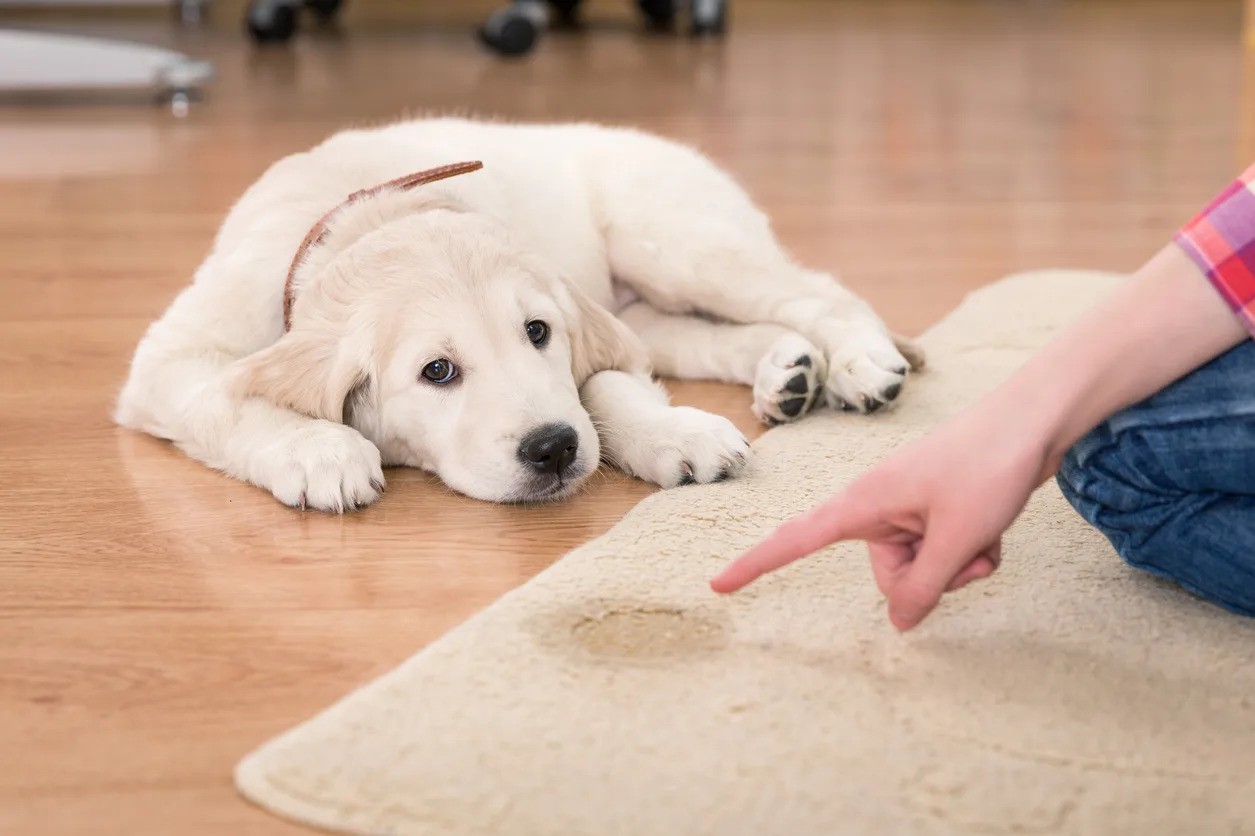
Golden Retrievers are smart dogs, and they know how to give clear signs when they need to go. Watch for behaviors like circling, sniffing the ground intently, whining, or scratching at doors. When you spot these signs, don’t delay – immediately take your puppy to their designated spot.
Quick response times are crucial in the early stages of training. Every time you help your puppy succeed in using their designated spot, you’re reinforcing good habits. Every accident indoors is a missed opportunity for positive reinforcement.
Some puppies may display more subtle signs, like becoming restless or leaving a play session abruptly. Learning to read your individual puppy’s unique signals takes time, but the effort pays off in fewer accidents and faster training success.
The Power of Positive Reinforcement
Golden Retrievers thrive on praise and positive reinforcement. When your puppy successfully uses their designated bathroom spot, celebrate! Offer immediate praise and a small treat. The timing of this reward is crucial – your puppy needs to connect the reward with the action they just performed.
Remember: accidents happen, and punishment isn’t part of successful potty training. If you catch your puppy in the act indoors, calmly interrupt them and take them to their proper spot. Clean any accidents thoroughly with an enzymatic cleaner to remove lingering odors that might attract your puppy back to the same spot.
Consistency in your rewards is key. Some owners make the mistake of reducing rewards too quickly. While you can eventually phase out treats, maintain verbal praise and positive attention for several months to reinforce good habits.
Establishing a Daily Routine
Your Golden Retriever will learn faster with a consistent daily schedule. While the exact timing might vary based on your lifestyle, try to maintain regular potty breaks throughout the day. Early morning and late evening outings are essential, along with consistent breaks after meals and playtime.
During potty breaks, give your puppy time to get comfortable. Some puppies need a few minutes to explore their spot before they’re ready to go. Stay with them until they’re finished so you can offer immediate praise and rewards.
Remember that exercise and playtime can stimulate the need to go potty. Plan activity sessions around bathroom breaks to prevent accidents during play. This might mean a quick potty break before starting a training session or interactive game.
Overcoming Common Challenges
Even the smartest Golden Retrievers may face setbacks during potty training. Don’t be discouraged if your previously well-trained puppy has occasional accidents – this is normal during times of stress or change. Maintain your consistent routine and positive approach, and your puppy will get back on track.
Weather can present another challenge, as some Golden Retrievers are sensitive to rain or cold. Create positive associations with outdoor potty breaks in all weather conditions by using high-value treats and extra praise during challenging weather.
Changes in routine, such as moving to a new home or having house guests, can temporarily disrupt potty training progress. During these times, you might need to return to more frequent potty breaks and closer supervision to prevent accidents.
Advanced Training Tips for Success
Once your Golden Retriever understands the basics, consider teaching them to signal when they need to go out. Many owners successfully use bell training, teaching their puppies to nudge bells hung by the door when they need a bathroom break. This gives your puppy a clear way to communicate their needs.
Keeping a log during the first few weeks can help you identify patterns and adjust your schedule accordingly. Note the times of both accidents and successful potty breaks – this information can be invaluable for preventing future accidents.
Consider introducing different potty spot locations gradually. While starting with one specific area helps establish habits, eventually you’ll want your Golden Retriever to understand that they can relieve themselves in various appropriate outdoor locations.
When to Seek Professional Help
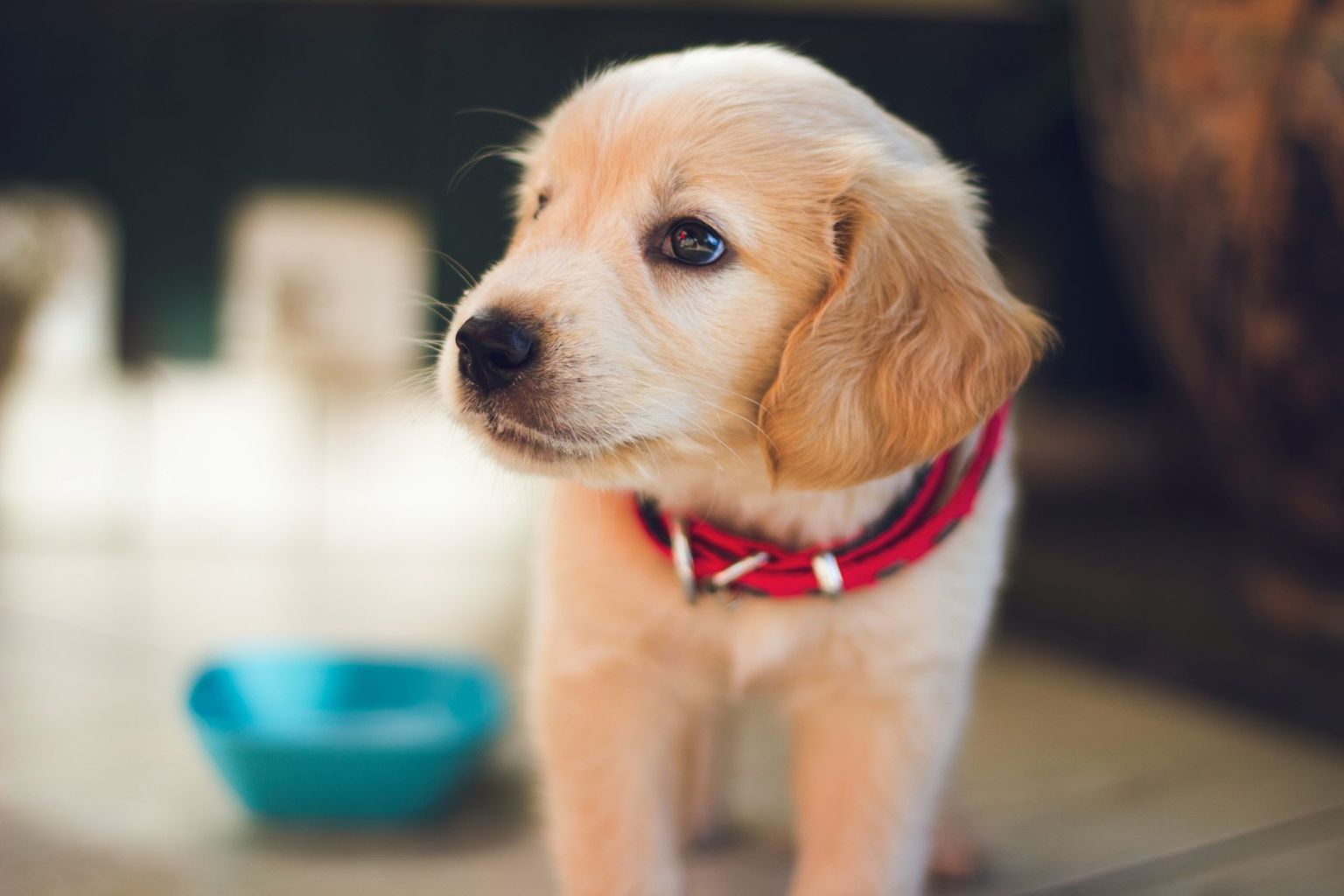
While most Golden Retrievers respond well to consistent potty training, some situations might require expert guidance. If your puppy shows signs of anxiety or continues having frequent accidents despite following a consistent routine, consult your veterinarian. Sometimes, what appears to be a training issue could be related to an underlying medical condition.
Professional trainers can also offer valuable insights if you’re struggling with specific aspects of potty training. They might notice patterns you’ve missed or suggest adjustments to your training approach that better suit your puppy’s personality.
The Path to a Well-Trained Golden Retriever
Remember that potty training is more than just teaching your Golden Retriever where to go – it’s about building trust and communication. Choose high-quality food for Golden Retrievers to promote gut health, stay patient, maintain your routine, and celebrate progress along the way. Your dedication during these early months will lay the foundation for a lifetime of good habits.
Keep your expectations realistic and remember that every puppy learns at their own pace. With consistency, patience, and positive reinforcement, your Golden Retriever will master potty training and become the well-mannered family member you’ve dreamed of. The challenges of these early training days will soon be a distant memory, replaced by the joy of living with a perfectly house-trained Golden Retriever.

As a dedicated pet writer with a passion for Golden Retrievers, I’ve spent years studying and writing information to help owners give the finest care for their beautiful companions. While I do not personally own a Golden Retriever, my writing stems from a genuine love for the breed and a desire to provide useful, well-researched information. My goal is to provide practical and useful advice to Golden Retriever owners on topics such as food selection, common health conditions, and training strategies.

